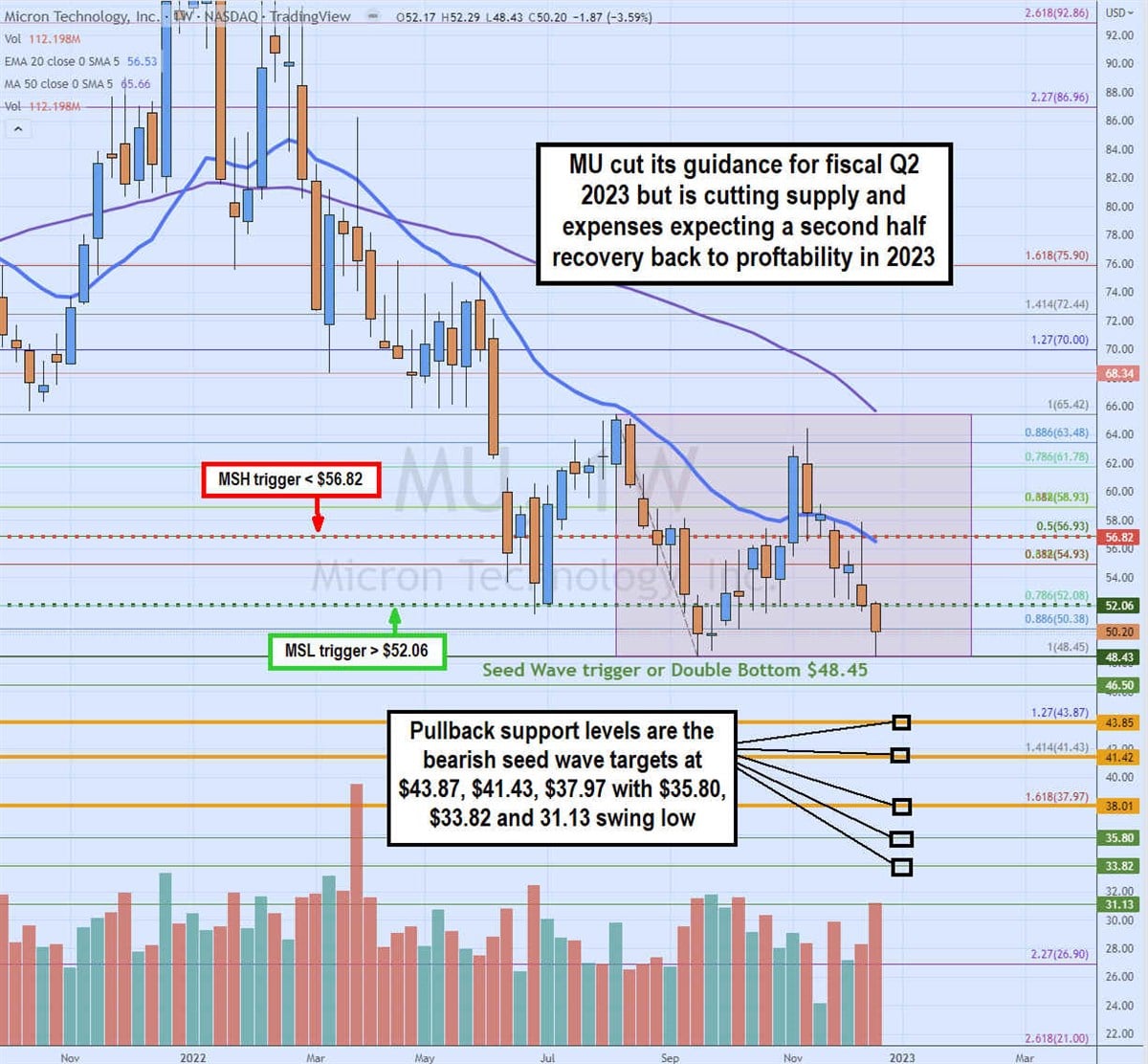Micron Technology Sees Chip Recovery by the End of 2023 Memory and storage chip giant Micron Technology Inc. (NYSE: MU) stock has fallen (-46%) in 2022. Dynamic random access memory (DRAM) chip demand has been weak.
By Jea Yu
This story originally appeared on MarketBeat


Memory and storage chip giant Micron Technology Inc. (NYSE: M.U.) stock has fallen (-46%) in 2022. This is because dynamic random access memory (DRAM) chip demand has been weak. Nevertheless, it is the third largest player in the DRAM market, with a 23.5% global market share behind Samsung Electronics Co. Limited (OTCMKTS: SSNLF).
Its memory chips are found in every electronic device and computer under various brand names, including Crucial. However, the supply glut in DRAM and NAND has caused demand to fall off. Even CPU and GPU makers like Intel Corporation (NASDAQ: INTC), Applied Micro Devices Inc. (NYSE: AMD), NVIDIA Corporation (NASDAQ: NVDA), and Broadcom Inc. (NASDAQ: AVGO).
Memory storage device makers Seagate Technology Holdings PLC (NYSE: STX) and Western Digital Co. (NYSE: WDC) are feeling the demand shock. Micron's business has fallen beyond the normalization phase straight into a valley.
The Company is working to quickly cut down the supply to bring it closer to matching the lowered demand. While the automotive sector was the only bright spot with a 30% sales growth, it is too small a percentage to offset the fall in mobile devices and P.C.s and data center and cloud segments. Bulls will argue that the worst is behind Micron, while bears will call for more downside.
Here's Why Chips are Down
The pandemic caused a supply shortage in DRAM chips as demand stripped the dwindling supply due to COVID lockdowns. The re-opening brought chip production back online as production ramped up to exceed the market and build up inventories. However, inflationary pressures and logistics cost inflation caused demand to fall again and accelerate as technology companies go into heavy cost-cutting and layoff mode.
The Companies that loaded up on DRAM are opting to use the inventories rather than place new orders. Micron is caught on the short end as falling order sizes, inventory oversupply, and a contracting economy are headwinds that will also see the export restrictions imposed by the U.S. government to end shipping advanced cutting-edge chips to China as a matter of national security.
Samsung Oversupplying the Market
Additionally, part of the oversupply of DRAM chips is due to the overproduction by Samsung, the top player in memory chips with a 43.5% market share. Even as Micron seeks to cut production, Samsung is bent on increasing its market share by flooding the market with chips to offset any production cuts by its competitors, thereby growing its market share even at a loss.
Nasty Earnings
On Dec. 21, 2022, Micron released its fiscal first-quarter 2023 results for November 2022. The Company reported an earnings-per-share (EPS) loss of (-$0.04) excluding non-recurring items versus consensus analyst estimates for a loss of ($0.02), a (-$0.02) miss. Revenues fell (-46.9%) year-over-year (YoY) to $4.08 billion, missing analyst estimates of $4.14 billion. The Company bought back $425 million of its stock at an average of $49.57.
Micron Technology CEO Sanjay Mehrotra commented, "Micron's strong technology, manufacturing and financial position put us on solid footing to navigate the near-term environment, and we are taking decisive actions to cut our supply and expenses. As a result, we expect improving customer inventories to increase revenue in the fiscal second half and to deliver strong profitability once we get past this downturn."
Lowered Guidance
Micron lowered its fiscal Q2 2023 EPS guidance for losses to come in between (-$0.72) to (-$0.52) versus (-$0.32) consensus analyst estimates. Revenues are expected to come between $3.60 billion and $4.00 billion versus $3.84 billion analyst estimates. It expects improving customer inventories in the fiscal second half of 2023.
Analysts Revisions
Analysts revised their ratings and price targets after the disastrous quarter. J.P. Morgan left its rating on Micro unchanged at Overweight with a $65 stock price target. Morgan Stanley kept its Underweight rating but cut its price target to $46 from $49. Cowen reiterates its Outperform rating with a price target lowered to $66. Mizuho reiterated its Neutral rating with a lower price target of $48 from $50. UBS reiterates its Buy rating but cut its price target from $75 to $70 per share.

Double Bottom or Bearish Seed Wave?
M.U. weekly candlestick chart has been chopped into a rectangle range between $65.42 and $48.45. It is retesting the lower range and swing low for a potential double bottom at $48.45 if it can successfully bounce back up through the weekly market structure low (MSL) buy trigger at $52.06.
The second market structure high (MSH) sale triggered the breakdown through $56.82. The falling weekly 20-period exponential moving average (EMA) resistance is at $56.53, followed by the weekly 50-period M.A. at $65.66. The back-to-back lower MSHs sets up a bearish seed wave breakdown if the swing low can't hold support at $48.45. The downside targets are the fib extension ratios of 1.27 at $43.87, 1.414 at $41.43, and 1.618 at $37.97. These are price reversal zones (PRZs) and act as downside supports on a breakdown or pullback. Further pullback supports sit at $35.80, $33.82, and $31.13 prior swing low.











